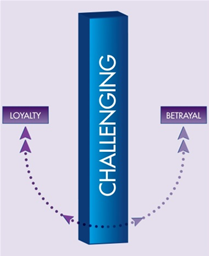 Differences between the generations can act as a wedge and drive the four generations apart or these differences can act as a catalyst generating the divergent thinking critical to ignite innovation and enable collaborative decision making.
Differences between the generations can act as a wedge and drive the four generations apart or these differences can act as a catalyst generating the divergent thinking critical to ignite innovation and enable collaborative decision making.
Ask any top leader and most respond positively about striving for more innovation within the business and will intellectually appreciate the value collaboration brings. Too many organisations still suffer the consequences brought about by continued silo mentality.
Discover 5 practical ways for all generations to unlock the same valuable opportunities presented to them in a divergent, innovative and yet collaborative way.
Get started by acknowledging everyone is responsible for the current status quo. Next agree that past experience is not going to be enough to disrupt this current status quo so leadership teams are ready to shift the business into the future. By acknowledging business is operating in a VUCA environment (Volatile; Uncertain: Complex: Ambiguous) then it is critical also to recognise all four generations need to take responsibility for what is created in the future. This environment is far less predictable than what Baby Boomers experienced at similar ages to Gen Y – so the relevance of their experience can and should be challenged.
Here are examples of what is currently being experienced – there is:
- Intellectual support for collaboration is not matched with actions
- Judgement and labelling of each other based on differences
- Social connection and transparency is very different across the generations
- Low levels of engagement
- Devaluation of loyalty and this is negatively impacting on retention.
For example, Gen Y does not need to be “persuaded” of the facts because they check them out on Google for themselves – so this generation is less reliant on influencing as a critical skill. They can be judged for this lack of prioritisation by the Baby Boomers. Therefore the past life experience of building a case (to persuade a decision being made by someone else) around facts might not be the optimal strategy for taking the business forward. This is especially the case when operating within VUCA – where the facts change very quickly; and when people increasingly prefer to check out the facts themselves.
Another very real example that rears its head regularly is that of RESPECT – and how this impacts on the relevance of experience and the way generations judge each other. Kick start this exploration with an analysis of the impact of nature Vs nurture. Baby Boomers were generally nurtured to respect their elders in very different ways to how Gen Y were nurtured to demonstrate respect. Think back and most Baby Boomers were raised with the philosophy of “children are to be seen and not heard.” Children did not dare challenge the view or thinking of an older person. This contrasts directly with the education of Gen Y – where Universities are educating them overtly to “challenge” no matter the age, the number of degrees or the years of experience – respect is demonstrated in the language chosen when engaging in the challenging conversation.
Critically, existing leaders or Executive Team Members would do well to decide what kind of leadership behaviours are required in the future for the business to execute on its strategic direction. Past experiences are not really as relevant if this approach is adopted. It is all about determining what behaviours are best suited to unlocking valuable opportunities and generating success for the future.
Here are 5 practical ways for all generations to unlock the same valuable opportunities presented to each of them in a divergent, innovative and yet collaborative way:
1.Build trust consciously
Each generation takes responsibility to stop judging and build trust with each individual they interact with on a daily basis at work:
“Simply put, trust means confidence. The opposite of trust – distrust – is suspicion. When you trust people, you have confidence in them – in their integrity and in their abilities. When you distrust people, you are suspicious of them – of their integrity, their agenda, their capabilities, or their track record. It’s that simple.” Stephen M.R. Covey
2. Encourage challenging as a constructive business behaviour
Stop viewing differences negatively and instead look for ways to encourage the divergent thinking that enables innovation. This means everyone comes with intent to engage in challenging conversations – either initiating them or being on the receiving end of them.
People and especially leaders, from all generations, benefit from finding their “core” to prevent the current pendulum swing between loyalty and betrayal – stop demanding loyalty and stop perceiving or encouraging betrayal. This is so very prevalent between the generations right now. To unleash this core be prepared TO challenge and BE challenged.
When challenging is a core business behaviour people are upfront, honest, authentic and inspiring – owning their thoughts and “having their own back”. As opposed to loyalty and betrayal which are at both ends of the pendulum and represent defensive behaviours. Perceived as using betrayal means you need to “cover your back” while you choose to use loyalty to “protect your back”.
Challenging is pivotal for all people spanning each generation, inspired to lead courageously and authentically and is revealed in “real” conversations where:
- Existing habits are questioned
- Current thinking is challenged
- Feedback is elicited
- Feedback is given
- Questions are asked to seek further insights and information
- Existing ways of doing things are examined and reviewed for improvements.
3.Develop confidence and capability to ignite and resolve conflict constructively
When people adopt the mindset to expect that conflict will happen, build emotional resilience and embrace the conflict in order to resolve and handle it brilliantly then inter-generational leadership will succeed. Always remember why conflict is such a remarkable business performance tool – it is a process that produces something of great beauty – just like the pearl – it is the result of great irritation.
So when people feel particularly stressed and frustrated by the process of conflict instead of becoming defensive and thinking negative thoughts, stick with it, knowing something of great beauty will be produced. Recognise these feelings of irritation are completely essential to this remarkable process.
4.Demonstrate the courage to be “real” in every relationship
Every relationship is built one conversation at a time, and conversations bring courage into action – they give it tangibility. Every conversation we have reveals what is important to us, brings the values to life and influences the culture of the team, the business unit and the organisation. When people know themselves well and feel confident they are ready to make themselves vulnerable by being completely transparent and honest with others (courage). Conversations enable people to make decisions, share decisions, share divergent thinking, share innovative thinking and ask questions to seek out new ideas and ways of doing things. Having the courage to share like this is equally as important as the courage to really listen. It is only by balancing these opposing tensions that people create an ‘open space’ for their relationships where each person can put their courage into action within “real” conversations.
In this open space trust is deep, everyone is engaging at a real level with others and are relying upon each other to be totally honest and transparent. This definitely evokes feelings of vulnerability.
Courage and trust are highly personal and individualistic and requires each person to bring a level of consciousness and recognition about how they use them and rely on them when engaging in these “real” conversations. Only an individual can hold themselves accountable for “speaking out”. No one else knows they wanted to speak out or had something to say if they leave the conversation without saying what was rattling around in their head
5.Be vulnerable in interactions with others – especially intergenerationally
Courage, trust and vulnerability have a symbiotic relationship – the more trust people have the more courage they are likely to demonstrate within the team/the relationship/the business because they are confident their vulnerability is going to be seen and treated constructively.
“The courage to be vulnerable means taking off the armour we use to protect ourselves, putting down the weapons we use to keep people at a distance, showing up and letting ourselves be seen.” ~Brené Brown









